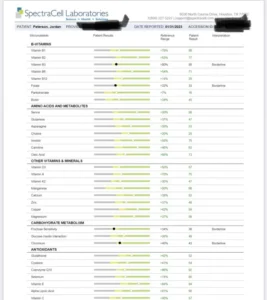I’ve been scrolling through comments and there have been a number of questions about what type of meat I’m eating. Sorry, I don’t get to them all, I’m super busy and there are a lot of comments. They’re great to read but I’m too slow to keep up!
A couple of things:
- I try to buy antibiotic/hormone-free grass-fed beef as much as I can. Ribeye is my favorite, but I’ll also eat blade roasts (they’re fattier), and ground beef. Grass-fed beef is really expensive so I’m not always eating grass-fed. Sometimes it’s grain-finished.
- I always avoid antibiotics in meat.
- All this being said, I haven’t had a bad reaction to grain-fed beef with antibiotics/hormones. When I went to Europe it was hard to tell what was in the meat. I didn’t have a reaction to any of it, even though some of it tasted awful. I don’t have a reaction to grain-fed beef either. If I go to a restaurant and order a steak, chances are its grain-fed and has antibiotics, and it doesn’t make me flare.
I guess my suggestion would be: Shop around, look for a butcher at cheaper prices. Farmer’s markets are great. We shop with Mennonites on the weekend and they have inexpensive beef that’s grass-fed (although not always) and antibiotic/hormone-free. If the price is a huge issue and a game-changer, it’s better to just eat more meat even if it’s grain-fed with antibiotics, than to not eat more meat. Theoretically, the grass-fed antibiotic-free meat is better for you (and it makes sense that it would be) so that’s what I try to eat, but I honestly haven’t physically noticed a difference between that and grain-fed with antibiotics.





Hi Mikhaila,
Your story and blog are so inspiring. My husband suffers from Crohn’s disease and some other issues, and we have noticed that he did best on an essentially “Paleo” diet… But as one does, we’ve fallen off the wagon. Time to get back on!
That said, I have recently been reading the Nourishing Traditions…philosophy, I guess? That book encourages consumption of dairy, as long as it’s cultured and the individual doesn’t have symptoms of an intolerance, and consumption of grains as long as they’re soured, sprouted, or soaked before preparing (supposedly the are traditional methods).
Do you have any experience with these Nourishing Traditions ideas? I find it hard to understand how we can cut out bread, the “staff of life” for much of our history, completely. Ditto dairy, when surely owning a cow and utilizing her milk, cream, and butter was as normal for many people as having chickens around for the eggs for centuries? I do think it’s plausible that modern mass-produced versions are bad for us, though…?
Thanks,
Katharine
Hi Katharine,
I just wanted to give you a word of warning.
Nourishing Traditions is an ok book, but, be aware that Weston Price himself told people not to consume rancid oils or fats. He was right and saw it’s devistation in the experimental animals. It destroys hearts, livers, etc. Some people from the Weston Price groups advocate the use of “fermented cod liver oil”. It is rotten and will destroy health just like Weston Price discovered many years ago.
Hey Mikhaila
Thank you for running this blog and giving us an insight into some alternative dietary choices.
I wanted to ask, because I didn’t see anywhere on this page a mention of you eating many white meats such as chicken – Are you pretty much entirely focusing on cow and other types of red meat?
Also, I had always been led to believe that red meat really isn’t something you shouldn’t eat too much of. I haven’t done any immediate research prior to posting this comment, so excuse me if this has been disproven, but what are your beliefs on this? Is there a reason why you aren’t eating a small amount of red meats and otherwise focusing on white?
Thank you
Rich
Red meat is villified more because of industry pressure from competing food producers than anything else.
It’s no different from the “food pyramid” promoting people to eat a diet that’s basically 90% starch and sugars, it’s all due to politics rather than what’s a proper diet.
Hi Mikhaila, Iam delighted for both you and your father that ye are doing alot better now i have listened to the the Joe Rogan podcast with your Dad and also your Q&A video on youtube. I have been suffering with headaches(veins bulging in my head near my temples and my hand) and floaters in my eyes and also muscles twitching all over my body. Iam really interested to know when exactly did you start noticing the floaters in your eyes disappearing was it after the carnivore diet or the previous diet with greens & meat. I would be very grateful if you could let me know. Hope you are still feeling happy and healthy.
Just to help clarify. No beef or dairy that is sold in the US or Canada and most all other countries has antibiotics in them. It is against the law to do so with heavy fines to pay. Products are tested to check also.
Animals may have been treated with antibiotics at some point in time in their life if they were sick. During that treatment time and for a set withdrawal period after the meat can’t be harvested and the milk can’t be sold.
I just want people to be educated and not afraid. Also don’t be fooled by the false marketing that it is “antibiotic” free because it all is.
All I know is I have a hard time digesting lower quality meat. I think it’s unwise to assume we know what actually happens when we give cows antibiotics. We know that once humans take them they basically lose parts of their microbiome that they can’t replace. We don’t know what that does to meat. That being said, lower quality meat doesn’t give me a flare up. Just digestive issues. But that’s something.
Lower quality meat tends to contain more hard to digest ligaments and stuff, which might cause stress on your digestive system.
Also, we’ve had several scandals here in Europe the last few years where meat processing industries were found to be selling illegal horse meat as beef, horse meat that came from riding horses and other sources that aren’t subject to the medical restrictions that animals raised for human consumption are.
Might well be similar things are going on in Canada and the US.
Sadly, with so much of competition between supermarkets being based exclusively on price, quality of food overall is taking a nosedive over the last few years.
Did you never get cross-contamination from ground beef? like if they used spices in the grinder before grinding your beef?
It’s never happened yet. Butchers are generally pretty good about it
Ok 🙂
Hello, I am new to this but I’m wondering what your take on eggs is? They aren’t technically in the dairy category but have you had any bad reactions to them when you’ve tried to eat them? Thanks!
Leave a comment